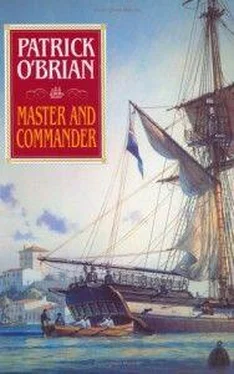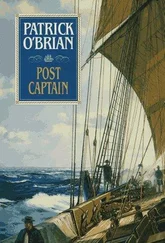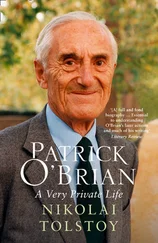The Cacafuego's head had fallen off she was pointing nearly south, and the Sophie had all the wind she needed to range alongside again. Again the thundering din roared and echoed round the sky, with the Spaniards trying to depress their guns, trying to fire down with muskets and blindly-held chance pistols over the side, to kill the gun-crews Their efforts were brave enough – one man balanced there to fire until he had been hit three times – but they seemed totaly disorganized Twice again they tried to board, and each time the sloop sheered off, cutting them up with terrible slaughter, lying off five or ten minutes, battering her upper-works, before coming in again to tear out her bowels. By now the guns were so hot that they could scarcely be touched; they were kicking furiously with every round. The sponges hissed and charred as they went in, and the guns were growing almost as dangerous to their crews as to their enemies.
And all this time the Spaniards fired on and on, irregularly, spasmodically, but never stopping. The Sophie's maintop had been hit again and again, and now it was coming to pieces – great lumps of timber falling down on deck, stanchions, hammocks. Her foresail yard was held only by its chains. Rigging hung in every direction and the sails had innumerable holes: burning wad was flying aboard all the time and the unengaged starboard crews were running to and fro with their fire-buckets. Yet within its confusion the Sophie's deck showed a beautiful pattern of movement -the powder passing up from the magazine and the shot, the gun-crews with their steady heave-crash-heave, a wounded man, a dead man carrying below, his place instantly taken without a word, every man intent, threading the dense smoke – no collisions, no jostling, almost no orders at all.
'We shall be a mere hull presently, however,' reflected Jack: it was unbelievable that no mast or yard had gone yet; but it could not last. Leaning down to Ellis he said in his ear, 'Cut along to the galley. Tell the cook to put all his dirty pans and coppers upside-down. Pullings, Babbington, stop the firing. Boom off, boom off. Back topsails. Mr Dillon, let the starboard watch black their faces in the galley as soon as I have spoken to them. Men, men,' he shouted as the Cacafuego slowly forged ahead, 'we must board and carry her. Now's the time – now or never – now or no quarter -now while she's staggering. Five minutes' hearty and she's ours. Axes and broadswords and away – starbowlines black their faces in the galley and forward with Mr Dillon – the rest aft along of me.'
He darted below. Stephen had four quiet wounded men, two corpses. 'We're boarding her,' said Jack. 'I must have your man – every man-jack aboard. Will you come?'
'I will not,' said Stephen. 'I will steer, if you choose.'
'Do – yes, do. Come on,' cried Jack.
On the littered deck and in the smoke Stephen saw the towering xebec's poop some twenty yards ahead on the port bow; the Sophie's crew in two parties, the one blackfaced and armed racing from the galley and gathering at the head, the other already aft, lining the rail – the purser pale and glaring, wild; the gunner blinking from the darkness below; the cook with his cleaver; Jack-in-the-dust; the ship's barber and his own loblolly boy were there. Stephen noticed his hare-lip grinning and he cherishing the curved spike of a boarding-axe, saying over and over again, 'I'll hit the buggers, I'll hit the buggers, I'll hit the buggers.' Some of the Spanish guns were still firing out into the vacancy.
'Braces,' called Jack, and the yards began to come round to fill the topsails. 'Dear Doctor, you know what to do?' Stephen nodded, taking over the spokes and feeling the life of the wheel. The quartermaster stepped away, picked up a cutlass with a grim look of delight. 'Doctor, what's the Spanish for fifty more men?'
'Otros cincuenta.'
'Otros cincuenta,' said Jack, looking into his face with a most affectionate smile. 'Now lay us alongside, I beg.' He nodded to him again, walked to the bulwark with his coxswain close behind and hoisted himself up, massive but lithe, and stood there holding the foremost shroud and swinging his sword, a long heavy cavalry sabre.
Holes and all, the topsails filled: the Sophie ranged up:
Stephen put the wheel hard over: the grinding crunch, the twang of some rope parting, a jerk, and they were fast together. With an enormous shrieking cheer fore and aft the Sophies leapt up the frigate's side.
Jack was over the shattered bulwark straight down on to a hot gun run in and smoking, and its swabber thrust at him with the pole. He cut sideways at the swabber's head; the swabber ducked fast and Jack leapt over his bowed shoulder onto the Cacafuego's deck. 'Come on, come on,' he roared, and rushed forwards striking furiously at the fleeing gun-crew and then at the pikes and swords opposing him -there were hundreds, hundreds of men crowding the deck, he noticed; and all the time he kept roaring 'Come on!'
For some moments the Spaniards gave way, as though amazed, and every one of the Sophie's men and boys came aboard, amidships and over the bow: the Spaniards gave way from abaft the mainmast, backing into the waist; but there they rallied. And now there was hard fighting, now there were cruel blows given and received – a dense mass of struggling men, tripping among the spars, scarcely room to fall, beating, hacking, pistolling one another; and detached fights of two or three men together round the edges, yelling like beasts. In the looser part of the main battle Jack had forced his way some three yards in: he had a soldier in front of him, and as their swords clashed high so a pikeman drove under his right arm, ripping the flesh outside his ribs and pulling out to stab again. Immediately behind him Bonden fired his pistol, blowing off the lower part of Jack's ear and killing the pikeman where he stood. Jack feinted at the soldier, a quick double slash, and brought his sword down on his shoulder with terrible force. The fight surged back: the soldier fell. Jack heaved out his sword, tight in bone, and glanced quickly fore and aft. 'This won't do,' he said.
Forward, under the fo'c'sle, the sheer weight and number of the three hundred Spaniards, now half recovered from their surprise, was pushing the Sophies back, driving a solid wedge between his band and Dillon's in the bows. Dillon must have been held up. The tide might turn at any second now. He leapt on to a gun and with a hail that ripped his throat he roared, 'Dillon, Dillon, the starboard gangway! Thrust for the starboard gangway!' For a fleeting moment, at the edge of his field of vision, he was aware of Stephen far below, on the deck of the Sophie, holding her wheel and gazing collectedly upwards. 'Otros cincuenta!' he shouted, for good measure: and as Stephen nodded, calling out something in Spanish, he raced back into the fight, his sword high and his pistol searching.
At this moment there was a frightful shrieking on the fo'c'sle, a most bitter, furious drive for the head of the gangway, a desperate struggle; something gave, and the dense mass of Spaniards in the waist turned to see these black faces rushing at them from behind. A confused milling round the frigate's bell, cries of every kind, the blackened Sophies cheering like madmen as they joined their friends, shots, the clash of arms, a trampling huddled retreat, all the Spaniards in the waist hampered, crowded in upon, unable to strike. The few on the quarter-deck ran forward along the larboard side to try to rally the people, to bring them into some order, at least to disengage the useless marines.
Jack's opponent, a little seaman, writhed away behind the capstan, and Jack heaved back out of the press. He looked up and down the clear run of deck. 'Bonden,' he shouted, plucking his arm, 'Go and strike those colours.'
Читать дальше
Конец ознакомительного отрывка
Купить книгу












